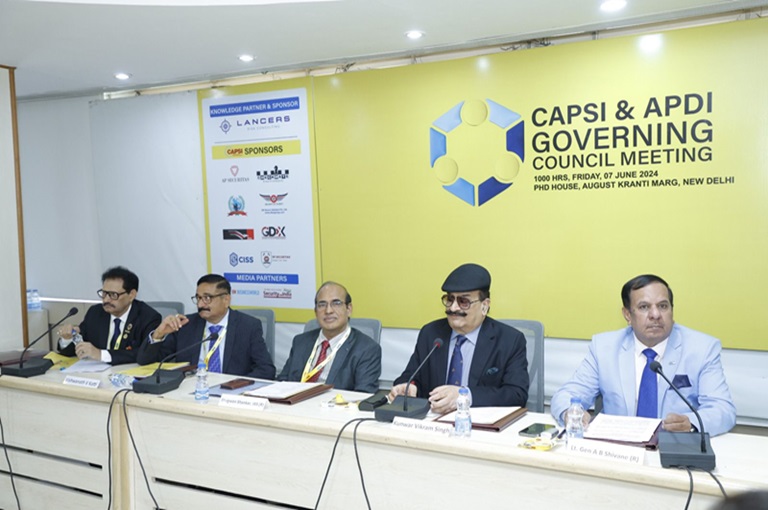
Addressing Security Threats: Lt Gen Shivane Calls for Citizen Engagement
New Delhi: In the vision of Viksit Bharat, evolving a robust citizen security culture stands as the critical path for Suraksit Bharat. Amidst escalating security threats, it emerges as a beacon of hope. Embracing justice, equity, and dignity, India grapples with safeguarding its citizens from diverse threats and vulnerabilities.
Recent Threats Highlight Security Concerns
Recent bomb hoax calls in schools, malls, and flights have highlighted the inadequacy of response and lack of security consciousness among citizens. The consequences of a real threat would be disastrous. The recent terror attacks in the Jammu sector remind us of the dark shadow of terrorism on soft targets. As citizens, we need to introspect and assess if we are security conscious and responsible. Is it a cultural deficit that exposes our vulnerability to escalating kinetic and non-kinetic threats?
Path to Sustainable Citizen Security
The path to Viksit Bharat requires Sustainable Citizen Security. Empowering communities is its cornerstone, necessitating a National Citizen’s Security Culture (NCSC). The Private Security Industry (PSI) and the Ministry of Home Affairs (MHA) can provide yeoman service. The Central Association of Private Security Industry (CAPSI), under Chairman Kunwar Vikram Singh, launched a novel initiative in March 2024. The first round table conference on March 15, 2024, aimed to evolve a strategic construct for its manifestation. CAPSI is leading the evolution of a National Citizen’s Security Culture.

Critical Security Deficit Gap
With a crime rate rising faster than population growth, new threats are emerging. In 2023, total cognizable crimes were 58,24,946 against a population of 1.44 billion, making the crime rate 422.2 per lakh persons. India ranks 79 among 197 countries in crime rates. The public-to-police ratio at 152.80 per lakh, against the UN-defined 222 per lakh, shows India is understaffed, exposing citizens’ safety. Bridging this gap is the responsibility of the PSI, with a one-crore workforce that must harness citizens as an extension of their arm to exhibit security consciousness as a culture. This requires an expanded role of PSI with transformation and technology integration. The national chorus must be “STAY ALERT-STAY SAFE.” Security is everyone’s responsibility.
Need for National Citizen’s Security Culture
India needs to evolve its National Citizen’s Security Culture for several reasons:
- Protection of Citizens: Enhance capacity to prevent and respond to various threats, creating a safer environment and building trust in the government’s ability to protect citizens.
- Empowerment and Resilience: Encourage vigilance, reporting suspicious activities, and taking precautions to protect communities.
- Strengthening Community Bonds: Foster community engagement and cooperation with local law enforcement.
- Prevention and Early Intervention: Emphasize preventive measures and early intervention through education and awareness campaigns.
- Countering Extremism and Violence: Promote inclusive values, tolerance, and respect for diversity to prevent radical ideologies.
- Economic Growth and Investment: Create a secure environment conducive to business and investment.
- International Cooperation: Align security practices with international standards to combat transnational security challenges.
Challenges to Citizen’s Security
India faces challenges like resource constraints, social fragmentation, institutional weaknesses, and technological disparities. Chanakya’s four types of threats—external, internally abetted, internal, and externally abetted—are relevant today, manifesting as kinetic and non-kinetic threats impacting citizens directly.
Understanding Citizen Security in the Indian Context
Citizen security in India encompasses traditional crime rates, communal tensions, cyber threats, and environmental degradation. National Citizen’s Security Culture refers to shared values, norms, beliefs, attitudes, behaviors, and actions promoting national security interests and citizen safety. The key challenge remains the “Cultural Change.”
Expectations from Citizens as Stakeholders of NCSC
- Follow: Security policies and procedures.
- Report: Unusual or suspicious activities.
- Provide: Feedback on security improvements.
- Lead: By example, displaying positive security behaviors.
- Strategies for Building a Citizen Security Culture
- Community Engagement and Participation: Establish community policing programs and citizen patrols.
- Strengthening Law Enforcement Capacities: Invest in professional development and deploy modern crime-fighting technologies.
- Promoting Legal Reforms and Access to Justice: Strengthen legal frameworks and enhance access to justice.
- Fostering Social Cohesion and Inclusion: Promote dialogue, tolerance, and understanding among diverse communities.
- Investing in Education and Awareness: Integrate civic education and human rights literacy in school curricula.
- Harnessing Technology for Security: Leverage technology for surveillance, reporting, and predictive policing.
- Promoting Cross-Sectoral Partnerships: Collaborate among government agencies, civil society, private sector, and international partners.
Conclusion: As India strides towards Viksit Bharat, cultivating a national citizen security culture emerges as a shared responsibility. It demands a paradigm shift from reactive measures to proactive strategies aimed at building resilient communities, fostering social cohesion, and upholding the rule of law. By adopting these strategies and fostering a culture of collaboration, accountability, and citizen participation, India can make significant strides towards building a citizen security culture that protects and promotes the rights, well-being, and dignity of all its citizens. If citizens win, India will win.
FOLLOW FOR MORE .




